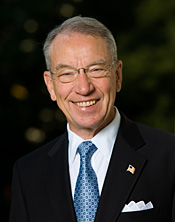
WASHINGTON – Legislation to provide a much needed update to the Whistleblower Protection Act has passed the Senate and is now expected to be signed into law by the President.
Sen. Charles Grassley said that whistleblowers are being denied the protections they should have under the law because of decisions of the Merit Systems Protection Board, the Federal Circuit Court of Appeals, and a general anti-whistleblower sentiment found in executive branch agencies.
Grassley co-authored the 1989 Whistleblower Protection Act with Senator Carl Levin of Michigan. The law provides protection for federal employees who expose waste, fraud and abuse in federal agencies. Grassley introduced the update, the Whistleblower Protection Enhancement Act, with Senators Daniel Akaka of Hawaii, Susan Collins of Maine and Joe Lieberman of Connecticut.
“This much needed update helps whistleblowers who risk their careers by sticking their necks out to simply tell the truth. The Whistleblower Protection Enhancement Act is an important step forward, but improvements are still needed to ensure that intelligence community whistleblowers receive the protection they deserve for uncovering fraud deep within the bureaucracy,” Grassley said.
A long-time advocate for whistleblowers, Grassley has stood up against the heavy hand of the bureaucracy – regardless of whether Republicans or Democrats were in charge — for individual whistleblowers from the Pentagon, the FBI, the Bureau of Alcohol, Tobacco, Firearms and Explosives, the IRS, the Interior Department, the Department of Health and Human Services, the Food and Drug Administration, and the Securities and Exchange Commission.
In addition to co-authoring the 1989 whistleblower law, Grassley also authored the 1986 update of the False Claims Act to include qui tam provisions that empower private citizens, who had information about fraudulent activity by government contractors, to bring wrongdoing forward and sue in the name of the government. To date, these whistleblower provisions have recovered more than $30 billion for taxpayers that otherwise would be lost to fraud.
In 2009, Grassley and Senator Patrick Leahy won passage of the Fraud Enforcement and Recovery Act which made the most significant improvements to the False Claims Act since 1986. The law restores the scope and applicability of the False Claims Act where it had been limited by court decisions. This effort also revised criminal laws to help prosecute mortgage fraud, securities fraud, and complex financial crimes that led to the 2008 financial crisis.
In addition, Grassley authored the 2006 overhaul of the IRS whistleblower program to fight major tax fraud. The IRS recently paid out its largest award ever, but has acknowledged, after scrutiny from Grassley, that the agency must be more timely and responsive in processing whistleblower claims.
Once signed into law, the Whistleblower Protection Enhancement Act of 2012 will:
• clarify that any disclosure of gross waste or mismanagement, fraud, abuse, or illegal activity may be protected, but not disagreements over legitimate policy decisions;
• suspend the sole jurisdiction of the Federal Circuit Court of Appeals over federal employee whistleblower cases for two years;
• extend Whistleblower Protection Act coverage and other non-discrimination and anti-retaliatory laws to all employees of the Transportation Security Administration;
• clarify that whistleblowers may disclose evidence of censorship of scientific or technical information under the same standards that apply to disclosures of other kinds of waste, fraud, and abuse;
• codify the anti-gag provision, which Grassley originally got passed, that has been part of every Transportation-Treasury Appropriations bill since 1988;
• establish Whistleblower Protection Ombudsmen to educate agency personnel about whistleblower rights; and
• provide the Office of Special Counsel with the independent right to file “friend of the court” briefs, or amicus briefs, with federal courts.








